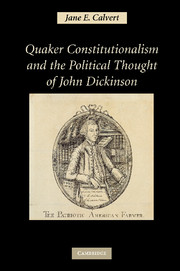Book contents
- Frontmatter
- Contents
- Acknowledgments
- Abbreviations
- Introduction
- I QUAKER CONSTITUTIONALISM IN THEORY AND PRACTICE, C. 1652–1763
- II THE POLITICAL QUAKERISM OF JOHN DICKINSON, 1763–1789
- 6 Turbulent but Pacific: “Dickinsonian Politics” in the American Revolution
- 7 “The Worthy Against the Licentious”: The Critical Period in Pennsylvania
- 8 “The Political Rock of Our Salvation”: The U.S. Constitution According to John Dickinson
- Epilogue: The Persistence of Quaker Constitutionalism, 1789–1963
- Bibliography
- Index
- References
7 - “The Worthy Against the Licentious”: The Critical Period in Pennsylvania
Published online by Cambridge University Press: 27 July 2009
- Frontmatter
- Contents
- Acknowledgments
- Abbreviations
- Introduction
- I QUAKER CONSTITUTIONALISM IN THEORY AND PRACTICE, C. 1652–1763
- II THE POLITICAL QUAKERISM OF JOHN DICKINSON, 1763–1789
- 6 Turbulent but Pacific: “Dickinsonian Politics” in the American Revolution
- 7 “The Worthy Against the Licentious”: The Critical Period in Pennsylvania
- 8 “The Political Rock of Our Salvation”: The U.S. Constitution According to John Dickinson
- Epilogue: The Persistence of Quaker Constitutionalism, 1789–1963
- Bibliography
- Index
- References
Summary
If the progress toward the Revolution in Pennsylvania was untidy, the realization of it was decidedly ugly. This chapter examines the extremely troubled period between the Revolution and the Constitutional Convention in order to shed light on John Dickinson's hopes for the new state and nation and his fears as national problems were magnified in Pennsylvania. Earlier arguments both in this study and elsewhere maintain that party lines were drawn based on religion and that theology has a significant “explanatory potential” that needs to be elucidated. We have already seen that, since the campaign for royal government in 1764, three Quaker-informed factions existed in Pennsylvania. Influenced by the conflict with Britain, two of them were gradually moving away from traditional Quaker theologico-politics – one toward individualistic, democratic, and armed radicalism; the other toward a withdrawn, passive stance, based on a new, narrower interpretation of the peace testimony. These factions were now set against one another with resistance to the British the apparent point of conflict. The radical group, in its beginnings hostile to Presbyterians in the campaign for royal government, now united with them, ostensibly to further the American cause. The withdrawing group of Quakers retreated from civic engagement and adopted a neutrality that was historically uncharacteristic of their Society when rights were threatened.
- Type
- Chapter
- Information
- Publisher: Cambridge University PressPrint publication year: 2008



